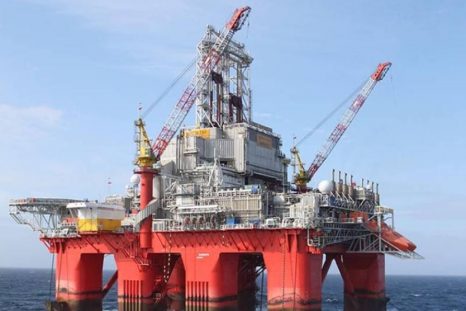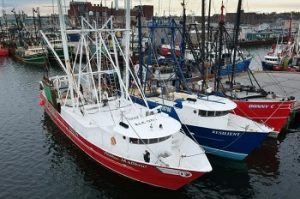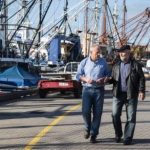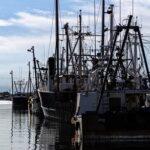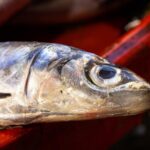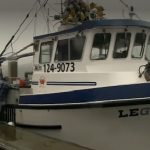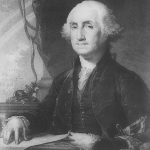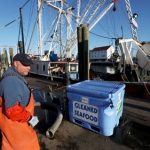Tag Archives: Canada-Newfoundland and Labrador Offshore Petroleum Board
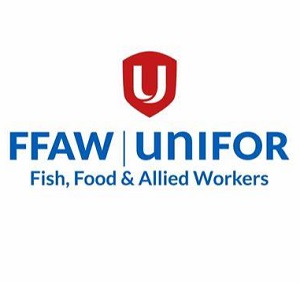
FFAW: Conflict Brews At-Sea as Drill Rig Takes Over Prime Crab Grounds
July 21, 2023 – Crab harvesters on the Avalon Peninsula are calling out the oil and gas industry as the Hercules drill rig, operated by ExxonMobil in the Jeanne d’Arc Basin, is in direct conflict with traditional prime fishing grounds. Despite vocal opposition from FFAW-Unifor throughout the consultation process with the regulatory body, the Canada-Newfoundland and Labrador Offshore Petroleum Board (C-NLOPB), the Board and Exxon proceeded with the drill operations during peak fishing time in an especially difficult year for harvesters. “Our members feel this brewing spatial conflict is representative of the continuous disregard for the fishing industry. Expansion of the oil and gas industry needs to be considered alongside the fishery, not in priority to it,” says FFAW-Unifor President Greg Pretty. >click to read the press release< 14:28

FFAW publicity stunt
The Federation of Independent Sea Harvesters of Newfoundland and Labrador (FISH-NL) calls the FFAW-Unifor’s submission of a land bid this morning to protect crab grounds a publicity stunt to deflect attention from the final days of FISH-NL’s membership drive. “The FFAW submits a fake cheque to protect snow crab grounds during the last week of FISH-NL’s drive the same way the union gave away free cod on the St. John’s waterfront the very day in early August that our drive began,” says Ryan Cleary, President of FISH-NL. “Inshore harvesters aren’t stunned— the FFAW just treats them as if they are. >click to read< 13:51
Fisheries union presents giant novelty cheque for $1 billion to C-NLOPB – >click to read<
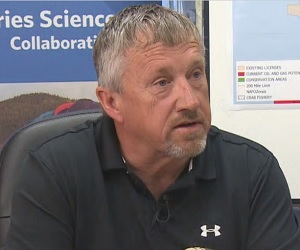
“we’ll go out with our vessels and we’ll get in the way”, FFAW vows to stop oil and gas exploration in crab fishing area
Newfoundland and Labrador’s largest fishermen’s union says oil companies shouldn’t be able to explore in some of the province’s most productive crab fishing areas — and members will stop them if necessary. Last week the C-NLOPB issued a call for nominations, asking oil companies which areas they’d be interested in bidding on. “We are not going to stand by and let someone take our livelihood,” said Fish Food and Allied Workers executive board member Nelson Bussey, who has fished for 43 years, on Thursday. “We’ve put too much into this. It’s our life, it’s our industry and we’re not going to stand by. If we’ve got to do it, we’ll go out with our vessels and we’ll get in the way.” >click to read< 20:36
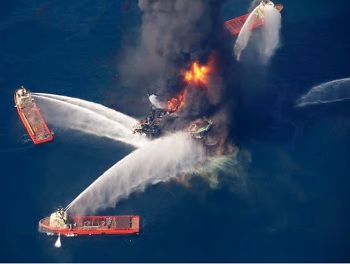
What Newfoundland and Labrador could learn from the worst offshore oil disaster in U.S. history
Marine scientist Donald Boesch says the controversy fuelled by recent oil spills off Canada’s East Coast has some “fairly interesting and striking comparisons” to his past work examining how the offshore (oil) industry is managed, as part of a U.S. inquiry into the Deepwater Horizon disaster.,,, Boesch says one of the most critical lessons the commission learned is that the U.S. agency overseeing offshore oil in the gulf had a conflict of interest built into its mandate.,,, Critics have accused the Canada-Newfoundland and Labrador Offshore Petroleum Board (C-NLOPB) of having a similar conflict. >click to read< 10:26
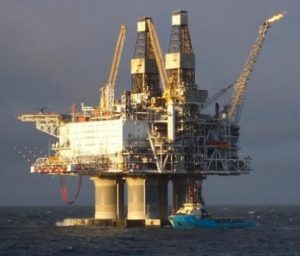
FISH-NL supports calls for independent offshore environmental authority; FFAW-Unifor must come clean with oil industry funding
The Federation of Independent Sea Harvesters of Newfoundland and Labrador (FISH-NL) supports calls for an independent authority to oversee the environment in the province’s offshore oil and gas industry. “There is growing evidence that the industry regulator, the Canada-Newfoundland and Labrador Offshore Petroleum Board, is unable to protect the environment,” says Ryan Cleary, President of FISH-NL. “Between seismic blasting and offshore spills, it’s full-speed ahead for the petroleum industry — the commercial fishery and marine environment be damned.” >click to read< 11:22

Oil in the Water: Hibernia power outage results in oil spill, response equipment deployed
The Hibernia Management and Development Company (HMDC) confirmed the platform lost power, causing water sprinkler systems to activate. The sprinklers caused the waste containment drain system, which contained water and some oil, to overflow onto the platform and into the ocean, the company said in a statement. HMDC estimated about 150 litres of oil spilled, based on the sheen observed. >click to read< 09:44

Cleanup called off after 12,000-litre Hibernia oil spill
It’s not possible to clean up what remains of an estimated 12,000 litres of oil spilled from the Hibernia platform off Newfoundland last month, according to the board that regulates the industry. The Canada-Newfoundland and Labrador Offshore Petroleum Board said in a statement Thursday that surveillance by satellite, air and sea in recent days showed the oil had become so diluted that it can no longer be recovered or dispersed. >click to read< 10:18

FISH-NL: C-NLOPB ‘waking up’ to concerns over impact of offshore seismic activity
The Federation of Independent Sea Harvesters of Newfoundland and Labrador (FISH-NL) is frustrated the Canada-Newfoundland and Labrador Offshore Petroleum Board isn’t prepared to suspend offshore seismic work, but encouraged the offshore oil and gas regulator is waking up to concerns. “Ottawa takes a precautionary approach to fisheries management — which means being cautious when science is uncertain — but there’s nothing precautionary about allowing seismic to continue until the potential risks are understood. ,” says Ryan Cleary, President of FISH-NL. “The hypocrisy doesn’t escape inshore harvesters.” >click to read<20:06
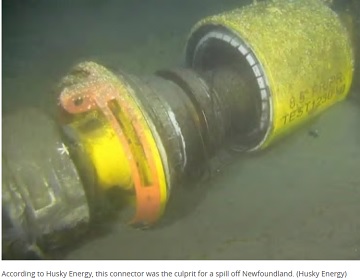
Not Good Enough – Husky ‘deeply sorry’ for oil spill last month off Newfoundland
Husky Energy says it is “deeply sorry” for back-to-back spills that sent a total of 250,000 litres of oil, water and gas into the ocean last month, and says it is making changes to prevent anything similar from happening again. The two spills occurred within an hour of each other on Nov. 16, the oil giant revealed in a statement Monday. Husky’s preliminary investigation is now in the hands of the Canada-Newfoundland and Labrador Offshore Petroleum Board (C-NLOPB), after the company submitted its preliminary report on Friday. The spill happened when a flowline connector failed near the South White Rose Extension drill centre, about 350 kilometres east of St. John’s, according to a media release. >click to read<15:58
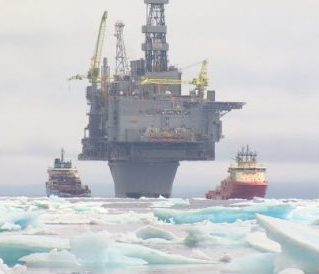
Poor weather prompts temp shutdown of all offshore rigs, preventing Husky clean up spill of 250,000 litres of crude
All offshore facilities have been temporarily shut down as a safety precaution due to stormy seas and will not resume operations until the offshore industry regulator says it’s safe to do so. The Canada-Newfoundland and Labrador Offshore Petroleum Board confirmed Saturday that the SeaRose FPSO, as well as the Terra Nova FPSO and the Hebron platform, had suspended operations just before bad weather hit. >click to read<16:53
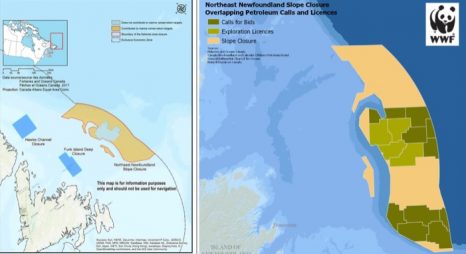
‘Protected’ marine area open to oil, gas exploration
Newfoundland and Labrador’s offshore oil and gas regulator is taking bids for exploration off the island’s east coast, in an area the federal government recently listed as a marine-protected area. While the area is closed to fishing, it remains open to the Canada-Newfoundland and Labrador Offshore Petroleum Board (C-NLOPB) — and that’s not sitting well with the president of the fisheries union. “We cannot ask fish harvesters to accept the closure of an area to fishing activity in the name of conservation while continuing to allow oil and gas exploration in that same area,” said Fish, Food and Allied Workers president Keith Sullivan in a news release.>click to read<13:39
Husky Energy’s White Rose Operation – Broken subsea equipment causes “major hydrocarbon gas release”
The Canada-Newfoundland and Labrador Offshore Petroleum Board reported a“major hydrocarbon gas release”  from underwater equipment in the oilfield’s southern drill centre late Monday afternoon. The board initially reported 8,938 kilograms of gas was released from two subsea wells, but later clarified that the release came from subsea equipment, not the wells itself, and that the release was stopped with 12 minutes of the initial alarm. Read the rest here 10:53
from underwater equipment in the oilfield’s southern drill centre late Monday afternoon. The board initially reported 8,938 kilograms of gas was released from two subsea wells, but later clarified that the release came from subsea equipment, not the wells itself, and that the release was stopped with 12 minutes of the initial alarm. Read the rest here 10:53
C-NLOPB investigating 6,000-litre spill, how it was measured
 The province’s offshore regulator wants some clarification on how the Hibernia consortium measures the size of oil spills. The decision comes in the wake of a crude oil spill near the platform in December. On Jan. 3, the Canada-Newfoundland and Labrador Offshore Petroleum Board issued an incident bulletin after being notified of a leak by the Hibernia Management Development Company (HMDC). Read more@cbcnews 09:19
The province’s offshore regulator wants some clarification on how the Hibernia consortium measures the size of oil spills. The decision comes in the wake of a crude oil spill near the platform in December. On Jan. 3, the Canada-Newfoundland and Labrador Offshore Petroleum Board issued an incident bulletin after being notified of a leak by the Hibernia Management Development Company (HMDC). Read more@cbcnews 09:19






